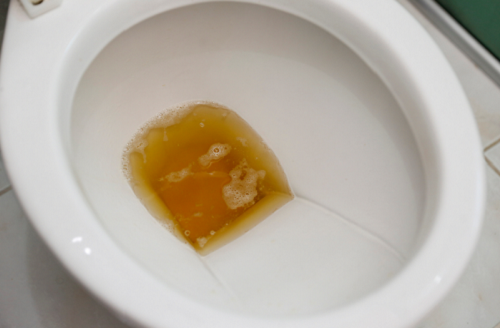You may have noticed something curious about your urine at home when it settles in the toilet bowl before flushing. The urine seems to sink right to the bottom and does not mix with water like other bathroom liquids. While this phenomenon might seem common, there are a few different reasons why urine sinks to bottom of toilet bowl, and some situations might need medical attention.
Let us look into the causes of the urine sinking in toilet, how to address the condition if it is not urgent, and other urine-related conditions that might need attention.
Reasons Why Urine Sinks to Bottom of Toilet Bowl
So, what does it mean when your pee sinks to the bottom of the toilet? There are two main reasons why your urine sinks to bottom of toilet. They include dehydration and proteinuria (presence of too much protein in the urine).
Dehydration
Not enough water in your body makes your urine more concentrated and darker in color. This can also lead to strong-smelling urine. If you’re dehydrated, you may note that dark urine sinks to bottom of toilet. This is because the concentrated urine is denser than water. Dehydration is mostly caused by an individual not taking in enough water. However, other factors could be contributing to dehydration, hence the reason why pee sinks to bottom of toilet.
They include:
Climate: When the weather is hot, it’s harder for your body to maintain a healthy balance of fluids because you’re sweating out more than you are drinking. The hotter the climate gets, the more water your body loses.
Health conditions: Many health conditions cause dehydration, such as diabetes, which affects how kidney function, or cushing syndrome, which causes increased thirst due to high levels of cortisol. Eating disorders like bulimia or chronic diarrhea also result in significant fluid loss.
Alcohol: Drinking alcohol might make you think you’re well hydrated, but it does the opposite. As a diuretic, alcohol forces your kidneys to excrete more water and electrolytes from your system, so you’ll need to drink even more fluids to avoid dehydrating.
Too Much Protein Present in the Urine (Proteinuria)
Another reason your urine might sink to the bottom of the bowl is if you have too much protein present in your urine, also known as proteinuria. If the Kidneys are not functioning properly, filtered nutrients like protein from the blood might leak into the urine.
The excessive leak of protein from the blood and into the urine eventually causes the urine to settle down in the toilet bowl as protein particles are heavier than water.
Causes of Proteinuria
Proteinuria can be caused by dehydration, kidney damage, or high blood pressure.
Dehydration: One possible cause of excessive protein leak into the urine is severe dehydration. Proteins and other nutrients are transported to the kidneys via water. Without sufficient water, the body will have difficulty transporting filtered nutrients from the kidneys. In turn, the kidneys are unable to recapture proteins properly. The protein instead ends up in the urine.
High Blood Pressure: High blood pressure can weaken or harden the kidneys over time. Eventually, these changes make the kidney unable to filter the blood and reabsorb proteins. In some individuals, high blood pressure can be as a result of genetics, overweight, sleep apnea, stress, smoking, etc.
Chronic Kidney Disease: Chronic kidney disease (CKD) is characterized by progressive kidney function loss. It may cause proteinuria in the early stages, but it usually doesn’t cause noticeable symptoms. If your CKD progresses, you may experience shortness of breath, frequent urination, hiccups, and fatigue.
What to Do If Your Urine Sinks to Bottom of Toilet
If you notice that heavy urine sinks to the bottom of toilet, then it most probably could be a sign of dehydration. There are several ways of remedying this issue, depending on its severity.
Increase your intake of fluids: The first thing to do if you think your urine is not as hydrated as it should be is to increase your intake of fluids. One way to stay hydrated is to add more water to your diet. Also, drink other types of beverages such as juice or tea.
Seek Medical Attention: When your urine persists in being concentrated for too long without correcting itself, seek medical attention immediately. Your health might be at risk. This could be a sign of underlying medical conditions, including bladder infections, kidney disease, etc.
When to Worry About Your Urine
Urine is usually not something you think about daily, but when you use the bathroom and see your urine, you might be able to tell if something isn’t quite right. The following are some of the urine conditions that probably need medical attention.
Presence of Blood
Blood in your urine can signify a serious medical condition, such as kidney disease or cancer. You must consult your doctor immediately if you see blood in your urine. Blood in your urine may appear pink, red, or brown. Other symptoms, such as pain or cloudy urine, may accompany it during urination.
Painful Urination
If you’re experiencing pain or burning sensations while urinating, it could signify a urinary tract infection (UTI). Other symptoms of a UTI include foul-smelling urine, cloudy urine, and the urge to urinate more frequently. If you think you might be suffering from a UTI, see a doctor so they can prescribe antibiotics.
Foul Smelling Urine
Concentrated urine will have a strong ammonia scent, while diluted urine has close to no smell. However, the smell of the urine is always influenced by what you ingest, be it medications or foods.
Even though urine odor is largely dependent on diet and medication intake, there are times when the smell of your urine might signal a health issue. When you notice you are passing very foul-smelling urine, seek medical attention immediately.
Final Thoughts On Why Urine Sinks to Bottom of Toilet
Urine not mixing with water is quite common, and the culprit is always dehydration. Stay hydrated if you want to have normal-looking urine. Another reason why urine sinks to bottom of toilet is too much protein in the urine.
Besides just sunken urine, if you’re experiencing other symptoms like pain when urinating, it’s best to see a doctor as soon as possible.


